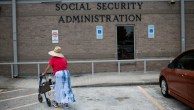
For the first time in many years, public concern over the budget deficit is increasing. In February, 11% cited the deficit or debt as the most important problem facing the nation. That is up from just 6% last August and the highest percentage volunteering the deficit as a top national problem in nearly two decades.
Pew Research’s annual public policy priorities survey, released in January, also found a modest rise in the percentage saying that reducing the budget deficit should be a top priority for the president and Congress — to 60%, from 53% a year earlier.
But concerns over deficits continue to be overshadowed by the public’s dominant worry — jobs. In February, nearly three times as many people said unemployment was the top national problem as cited the deficit (31% vs. 11%).
And, as was the case in the 1990s when the deficit became a major political issue, the public shows little willingness to cut government spending to bring down the deficit. In fact, in Pew Research’s survey in February as many said that they would place a higher priority on spending more to help the economy recover as on reducing the deficit (47% each). A recent CBS News/New York Times survey found majorities saying they would be unwilling to decrease spending in such areas as health care and education, or on the military, to reduce the federal budget deficit.
Shifting Partisan Concerns

In the past two years, there has been no difference between the priority Republicans and Democrats place on reducing the budget deficit. In the current survey, a single point separates Republicans (61% top priority) from Democrats (60% top priority). In 2009, partisans were equally close in their views. This is a dramatic change from much of the previous decade.
Throughout the Bush administration, Democrats expressed far more concern than Republicans over the deficit. The opposite was true in 1997, when Bill Clinton was in office. At that time significantly more Republicans than Democrats said reducing the budget deficit should be a top priority.
While virtually identical percentages of Republicans, Democrats and independents say that cutting the deficit is a major priority, the issue generates far more anger among Republicans — and independents — than it does among Democrats.

Nearly half (49%) of Republicans say growing deficits make them angry, compared with 41% of independents and just 25% of Democrats. Still, higher percentages in all three groups express anger over banks and financial institutions paying large bonuses to executives and the government’s bailout of major financial institutions than they do about the growing deficit. (See “Midterm Election Challenges for Both Parties,” Feb. 12, 2010.)
Tepid Support for Spending Cuts

While a relatively large proportion of independents express anger over the growing deficit, most (51%) place higher priority on spending more to help the economy recover than on reducing the deficit.
In this regard, the views of independents are closer to those of Democrats than of Republicans; 57% of Democrats give greater priority to spending more to help the economy recover, compared with just 34% of Republicans.
Even among Republicans, however, there is not a great deal of support for cutting spending to reduce the deficit. The CBS News/New York Times survey found that fewer than half of Republicans (47%) say they are willing to decrease spending for health care and education to reduce the budget deficit; about as many (45%) say they would be unwilling to cut spending in these areas. There is much less willingness among independents (28%) and Democrats (17%) to cut back spending on health care and education to reduce the deficit.
And just 31% of Republicans say they would be willing to decrease military spending to bring down the deficit. A majority of Democrats (55%) and 46% of independents say they would accept cuts in military spending to reduce the deficit.
Political Implications

Opinions about which party can better handle the deficit have shifted since the previous midterm campaign in 2006. Currently, 42% say the Republican Party can do a better job of reducing the deficit, while 36% say the Democratic Party can do better.
In September 2006, a few months before the Democrats regained control of Congress, they held a 20-point lead over the GOP as the party better able to reduce the deficit (47% to 27%). The deficit was a far less important issue then than it is today; just 1% volunteered it as the most important problem facing the United States. At the time, the war in Iraq was most frequently mentioned as the top problem (at 25%).
There are some similarities in current public views about the deficit today with opinions in July 1994, a few months before Republicans won control of both houses of Congress for the first time in four decades. In fact, the Republican Party then held a lead on handling the deficit identical to the lead it now holds (42% to 36%).
Yet the hierarchy of leading national issues is very different today than it was in 1994. Currently, the deficit is mentioned more frequently as a top problem (11% today vs. 5% then). But jobs and the economy are far more dominant issues now than they were 16 years ago. In July 1994, just 12% volunteered unemployment or jobs as the most important problem, placing them well behind crime (26%), which was the top issue. Today, 31% volunteer unemployment or jobs as the most important problem facing the nation, while another 24% mention the economy.




